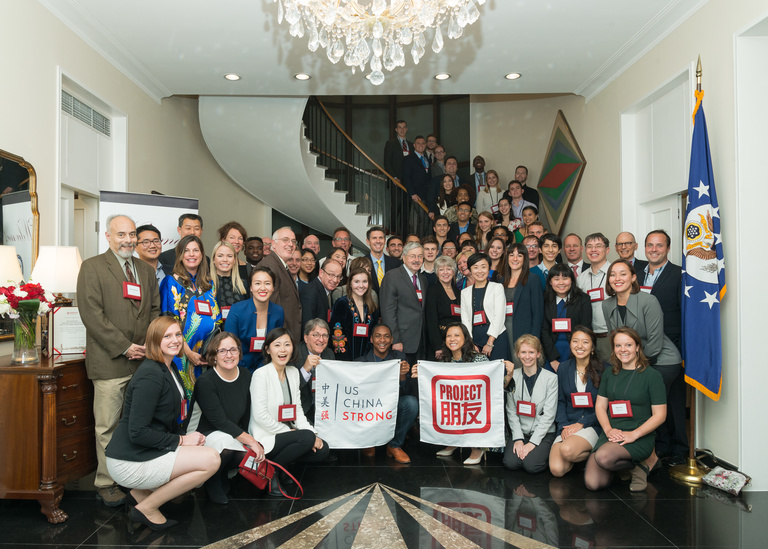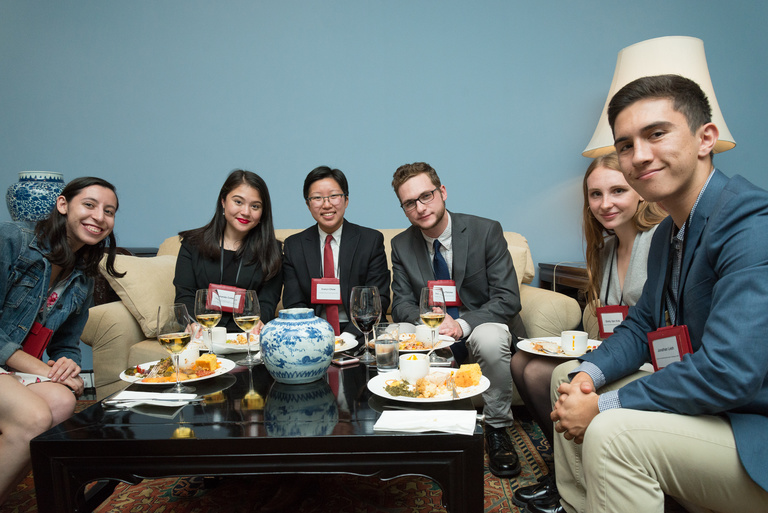
In 1985, the Iowa Sister States organization hosted a Chinese government delegation from Hebei Province, China in Muscatine, Iowa. The city of Beijing is one of four municipalities in China, and Hebei is the surrounding province. Following President Trump’s electoral success, he appointed then Iowa Governor Terry Branstad, to serve as U.S. ambassador to China. This month, I had the honor to attend a reception at the Ambassador’s residence, organized by the US-China Strong Foundation and Project Pengyou. The event was an opportunity to mingle with fellow students and educators who are living and studying abroad in China. Regarding Sino-Chinese relations, Ambassador Branstad has reiterated his commitment to his friendship with Chinese president Xi Jinping and the well-established connection between Iowa and Hebei.
Despite his close relationship with President Xi, Ambassador Branstad is not a Chinese speaker. With that said, each year fewer American students are deciding to study abroad in China. Although there is not a consensus on the reason for this decline, a series of assumptions can be made. Firstly, Chinese is a difficult language that requires committing oneself wholly to trying to learn it. In total, I have been studying Chinese for seven years. I began around the age of eight when I was living in Hong Kong and was attending an international school.
I have now been studying abroad in Beijing at Peking University for nearly two months. I have adjusted comfortably to living in a different language, while being registered for 20 hours of Mandarin classes each week. Nonetheless, I sometimes find myself sitting in class, feeling tired and asking myself, ‘Why do I do this?’ On days when I am especially tired, I have a moment of pseudo-clarity and I pause, thinking to myself that I do not understand Chinese at all, and again ask what I am doing sitting in this classroom. I do not think I am not the only one to feel this way – instead these feelings are experienced by many advancing Mandarin Chinese students.
In addition to the language being difficult to learn, life in China requires a huge adjustment. Often foreigners arrive in China and quickly settle into groups of people similar to them, often from the same country and socioeconomic background. For this reason, I have discovered the importance of befriending new people and exposing myself to new experiences while studying here.

Recently I read a critical article titled, “The View from the Veranda: Understanding Today’s Colonial Student.” From the article, I discerned the value in engaging with the local community outside of my cohort of Americans while studying abroad. Since then, I have befriended international students outside of the sphere Americans I am grouped with.
I have also managed to forge friendships with Chinese students studying at Peking University. Although there are definitely cultural barriers to my friendships with Chinese students, my familiarity with the language has enabled me to make progress in befriending students in the local community. Beyond my developing language skills, I am also aware of my privilege as a native English speaker. As a result, I have helped the Chinese students I have met to improve their English by proof reading papers and speeches, and switching between Chinese and English when talking to them. I also try to share my honest perspective of America when people ask me about it. Additionally, I have a Chinese language tutor with whom I make an effort to engage with outside of our regular tutoring sessions. When I am available, I sit in on class lectures with fully matriculated Chinese students attending Peking University. Finally, I joined the Peking University roller-blading club.
Many of my American classmates, who have opted to study in China for a semester rather than the full year, find that because their stay here is shorter, or because they do not have extensive Chinese proficiency, they lack the feeling of obligation to engage with the local community. Frankly, I find that this approach is a waste of the valuable time spent here. Already, I have benefited innumerably from existing outside of my American cohort. Studying Chinese has left a huge impact on my life. Even though it is challenging and I sometimes feel discouraged, my commitment to studying the language is renewed when I am able to connect with someone because of my proficiency in Mandarin and growing familiarity with Chinese culture. No doubt, the opportunity to eat Western style food at the U.S. ambassador’s residence is an additional benefit.

Emily Van Kirk is a Des Moines, IA native and Chinese and international relations major at the University of Iowa. Winner of a 2017 Boren Fellowship award, she will be spending the academic year in Beijing, China on the CIEE Beijing Intensive Chinese Language program.
Student blog entries posted to this International Accents page may not reflect the opinions and recommendations of UI Study Abroad and International Programs. The blog is intended to give students a forum for free expression of thoughts and experiences abroad in a respectful space.